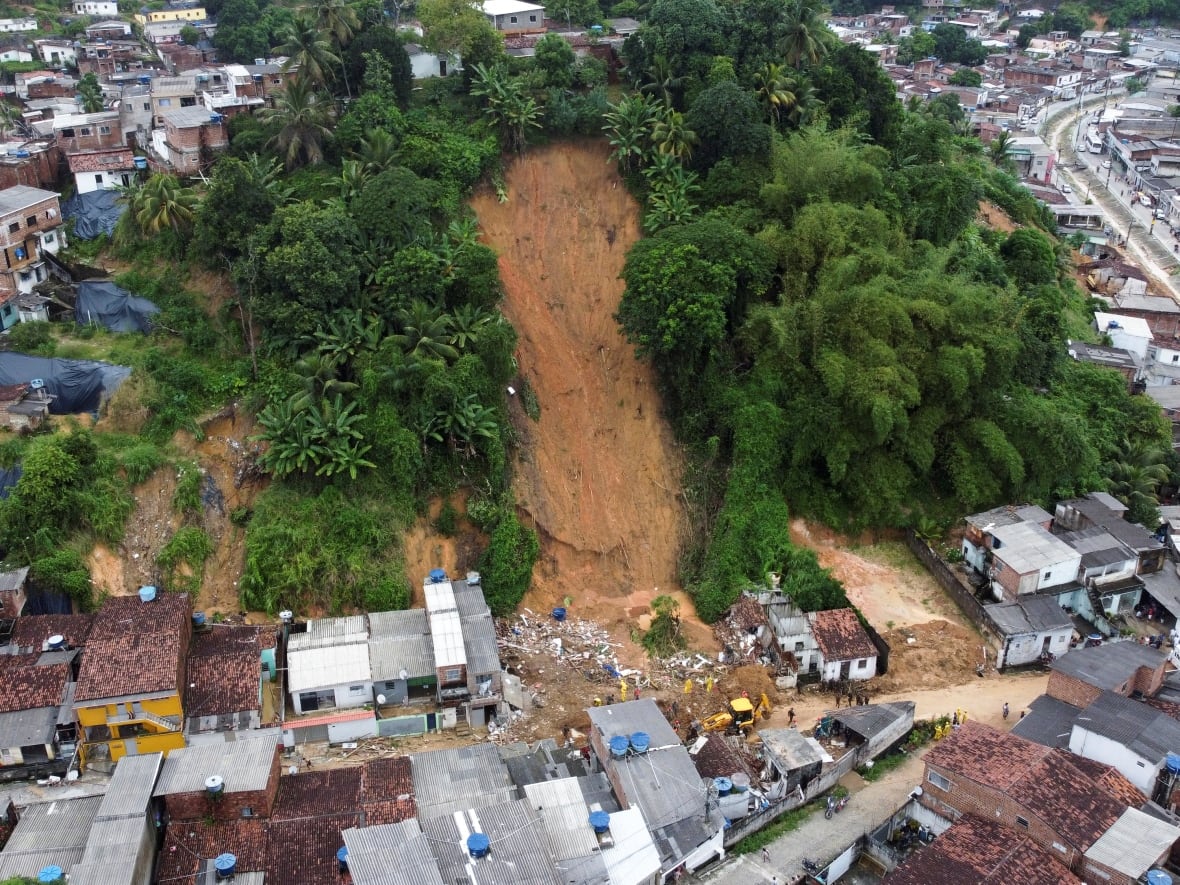7 July 2022
The role of climate change in the May 2022 landslides in Pernambuco, Brazil
Posted by Dave Petley
The role of climate change in the May 2022 landslides in Pernambuco, Brazil
On 27 and 28 May 2022 the state of Pernambuco in Brazil suffered exceptional rainfall that triggered deadly landslides, most particularly in the city of Recife. I wrote about these landslides at the time – the final toll is thought to have been 133 people, the large majority of whom died in landslides. Once again we have seen a landslide disaster caused by short duration, high intensity rainfall. As is often the case in these accidents, there has been discussion about the role of climate change.
This is the aftermath of one of the landslides:-

A landslide in Recife, Pernambuco, Brazil after the May 2022 extreme rainfall event. Image by Diego Nigro/Reuters via CBC.
.
The World Weather Attribution initiative is a consortium of universities and the Red Cross / Red Crescent, which focuses on using robust, peer reviewed methods to establish the role of climate change in extreme weather events. Earlier this week the consortium released results of a study into the landslides at Pernambuco. The focus of their study was 7-day and 15-day rainfall in the land areas affected by the heavy rainfall, based on the analysis of 75 rain gauge stations in the affected area.
The results are interesting. The rainfall lies in the range of 1-in-500 to 1-in-1000 year chance event. The team has noted that:-
“combining observations with our physical understanding of the climate system we conclude that human-caused climate change is, at least in part, responsible for the observed increases in likelihood and intensity of heavy rainfall events as observed in May 2022.”
They also conclude that the intensity of the rainfall is likely to have been increased by the impacts of climate change.
The evidence that climate change is placing a significant role in these extreme events is mounting. It is good though to see that the report highlights that a disaster is the consequence of the physical event and the vulnerability of the population. In poor areas of Recife this structural vulnerability is acute:-
The extreme nature of the floods made it so that exposure was the main determinant of impact, although long-term impacts and recovery will likely be mediated by socio-economic, demographic and governance factors. An increase in urbanisation, especially unplanned and informal in low-lying flood-prone areas and steep hillsides have increased the community exposure to these hazards. While forecasts and warnings were provided, it is unclear to what extent these informed anticipatory or early action that could have reduced the impacts.
Disasters are complex events, being exacerbated by climate change. Reduction is loss mostly occurs through measures that reduce exposure and vulnerability.


 Dave Petley is the Vice-Chancellor of the University of Hull in the United Kingdom. His blog provides commentary and analysis of landslide events occurring worldwide, including the landslides themselves, latest research, and conferences and meetings.
Dave Petley is the Vice-Chancellor of the University of Hull in the United Kingdom. His blog provides commentary and analysis of landslide events occurring worldwide, including the landslides themselves, latest research, and conferences and meetings.
Unplanned and Informal is the right definition, That is typical of areas like Pernambuco. No building codes or if there is one, not used.
Thank you for sharing this information.
Always interested to see observational bias not been given due consideration. The recent rain events in SE Australia another where lack of long term data biases model results.
[I simply do not agree. The article directly acknowledges this challenge on two occasions:
“But, as both events are far outside the previously observed records, it is not possible to quantify how much more likely climate change has made them to happen, based on observations.”
and
“While many climate models are able to simulate the main precipitation features over the region, we find that for this spatially small event, all models exhibit systematic errors in precipitation magnitudes, partly due to having coarse spatial resolution and misrepresentation of key physical processes (e.g. convection). We can therefore not quantify the role of climate change in the observed increase in likelihood and intensity.” D.]